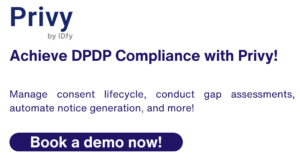The Data Protection Board (DPB) in India has emerged as a cornerstone of digital privacy enforcement. After all – with steep fines like Rs. 250 cr. you need a formal body to review any transgressions.
The Digital Personal Data Protection Act (DPDP Act), was passed to safeguard the personal data of individuals while promoting transparency and accountability among data processors and fiduciaries. As businesses and organizations increasingly depend on digital infrastructure to process and store vast amounts of personal data, the establishment of a regulatory body to oversee these processes becomes crucial.
In this blog, we will explore the role and structure of the Data Protection Board under the DPDP Act, along with its mandates, responsibilities, and enforcement mechanisms. Additionally, we will delve into the frequently asked questions (FAQs) that many individuals and organizations might have concerning the DPDP Act and its implications.
Understanding the DPDP Act
The DPDP Act, passed by the Indian government, represents a monumental shift in the landscape of data protection and privacy in India. The Act provides a legal framework for the processing of personal data, focusing on consent-based data processing, individual rights, data fiduciary obligations, and penalties for non-compliance.
The DPDP Act emphasizes:
- Rights of Data Principals: Individuals, referred to as Data Principals, have enhanced rights such as the right to access, correct, and delete their personal data, and the right to withdraw consent at any time. Say goodbye to those pesky unsolicited tele-callers with these new rights!
- Obligations of Data Fiduciaries: Organizations that process personal data, referred to as Data Fiduciaries, are mandated to ensure the protection, transparency, and lawful use of data. Privacy-considerations will forever change the way enterprises do business.
- Data Protection Board (DPB): To oversee compliance, the Act mandates the establishment of the Data Protection Board, which has significant powers to investigate complaints, enforce regulations, and impose penalties. Here comes data justice!
The Data Protection Board: Role and Responsibilities
The Data Protection Board is entrusted with enforcing the provisions of the DPDP Act.
You may be tempted to think it is largely a grievance redressal organization. But it is much more.
Its primary role is to ensure that data processing activities, whether carried out by government bodies, corporations, or other organizations, adhere to the principles of transparency, accountability, and fairness.
Key Responsibilities of the Data Protection Board
- Oversight of Data Fiduciaries: The Data Protection Board monitors compliance with the obligations set out in the DPDP Act, ensuring that Data Fiduciaries handle personal data responsibly. The DPB can also tell businesses to make changes in their current procedures to ensure that no more data privacy violations occur.
- Handling Data Principal Complaints: If an individual believes their data rights have been violated, they can file a complaint with the Data Protection Board, who will investigate the matter. The DPB can
- Enforcement and Penalties: The Data Protection Board has the authority to impose penalties for non-compliance with the DPDP Act. Depending on the severity of the breach, penalties can be significant, thus incentivizing organizations to adhere to the guidelines.
- Promoting Awareness: The Data Protection Board is also responsible for promoting awareness about data protection rights among the general public, ensuring that individuals understand how their data is used and processed.
- Collaboration with Sectoral Regulators: The DPDP Act acknowledges that specific industries, such as finance and healthcare, may have unique data protection needs. The Data Protection Board will collaborate with sectoral regulators like the RBI (Reserve Bank of India) and SEBI (Securities and Exchange Board of India) to ensure a comprehensive approach to data privacy.
Powers of the Data Protection Board
- Investigation: The DPB can launch investigations into organizations suspected of non-compliance with the DPDP Act.
- Penalty Imposition: Upon finding non-compliance, the DPB can levy penalties that may go up to several crores (upto 250 per violation) depending on the breach’s gravity.
- Issuing Directions: The Board can issue directions to data fiduciaries and processors to rectify their data handling processes to align with legal requirements.
Composition of the Data Protection Board
The DPB is composed of professionals with expertise in the fields of law, technology, and data governance. The board members are appointed by the central government, ensuring that they are equipped to handle complex data protection issues.
Implications of the DPDP Act for Businesses
The DPDP Act, and by extension, the DPB, places significant obligations on businesses operating in India or dealing with the data of Indian citizens. Some key areas where businesses will need to adapt include:
- Consent Management: Businesses must implement robust consent management systems, ensuring that individuals give clear and informed consent for the processing of their data. This includes creating transparent privacy policies and providing easy-to-understand consent notices. Solutions like Privy’s Consent Governance Platform (CGP) and Inspect AI are designed to help enterprises manage their consent processes efficiently, ensuring that they comply with the Act.
- Data Minimization: The principle of data minimization requires that businesses only collect and process the personal data necessary for a specific purpose. Data fiduciaries must regularly review their data collection practices to ensure they are not collecting more data than required.
- Data Audits and Compliance Reports: Under the DPDP Act, businesses must regularly audit their data processing practices and maintain detailed compliance reports. The DPB has the authority to request these reports during an investigation or routine check. Tools like Privy’s Inspect AI can automate privacy gap assessments, helping businesses maintain real-time visibility into their compliance status and generate reports for audits.
- Handling Data Subject Requests: Businesses must be prepared to handle requests from data principals, such as requests for data access, correction, or deletion. Platforms like the Privy CGP offer structured ways for managing these requests, ensuring that businesses can comply efficiently with the DPDP Act.
FAQs on the DPDP Act and the Data Protection Board
Q1. What is the Digital Personal Data Protection Act (DPDP Act)?
The DPDP Act is India’s legal framework aimed at protecting the personal data of individuals. It mandates how organizations can collect, process, and store personal data, focusing on consent-based data usage and transparency.
Q2. Who is a Data Principal?
A Data Principal is any individual whose personal data is being processed. Under the DPDP Act, data principals have rights such as the right to access, correct, delete, or withdraw consent for the use of their personal data.
Q3. Who is a Data Fiduciary?
A Data Fiduciary is any organization or entity that determines the purpose and means of processing personal data. Data fiduciaries are responsible for ensuring that data is processed lawfully and that the rights of data principals are protected.
Q4. What rights do individuals have under the DPDP Act?
Individuals, or data principals, have several rights under the DPDP Act, including:
- The right to access their personal data.
- The right to correct or update inaccurate data.
- The right to delete their data.
- The right to withdraw consent for data processing.
Q5. What is the role of the Data Protection Board (DPB)?
The DPB is the enforcement authority responsible for ensuring compliance with the DPDP Act. It handles complaints from individuals, investigates potential violations, and can impose penalties on organizations that fail to comply with the law.
Q6. What are the penalties for non-compliance with the DPDP Act?
Penalties for non-compliance with the DPDP Act can be significant, depending on the nature of the violation. The DPB has the authority to impose fines that may amount to several crores in cases of serious data breaches or repeated non-compliance.
Q7. How can businesses ensure compliance with the DPDP Act?
To ensure compliance, businesses must implement robust data protection measures, including:
- Obtaining informed consent for data processing.
- Ensuring data minimization.
- Regularly auditing their data processing activities.
- Responding promptly to data principal requests for data access, correction, or deletion.
Using platforms like Privy’s Consent Governance Platform (CGP) can streamline these processes and help businesses stay compliant.
Q8. What is consent management, and why is it important?
Consent management involves obtaining and managing permissions from individuals for the use of their personal data. Under the DPDP Act, organizations must ensure that data is only processed with the informed consent of the data principal. A robust consent management system is essential for complying with the Act and avoiding penalties.
Conclusion
The creation of the Data Protection Board marks a significant step toward ensuring digital privacy and data security in India. With the DPDP Act in place, individuals have greater control over their personal data, and organizations are held to higher standards of accountability and transparency. As businesses adapt to these regulations, tools like consent management platforms and automated privacy assessments will play a crucial role in helping them stay compliant.
The DPB’s oversight, combined with the growing awareness around data privacy, ensures that India is moving toward a more secure and transparent digital environment.
 IND
IND ID
ID PH
PH

